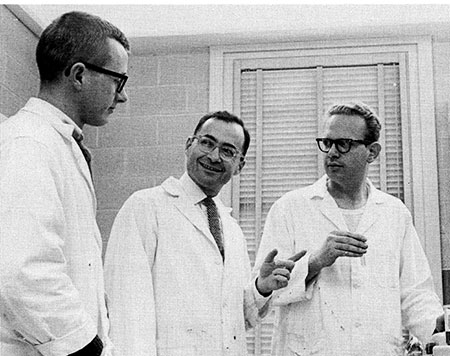A tribute to Professor Charles Weiss (1918-2018)
December 19, 2019
by Donald T. Lauria, PhD, Professor Emeritus, UNC Gillings School of Global Public Health
By modern standards of scholarship, the professional contributions of Charles Weiss may seem ordinary, but within the context of his times, they are remarkable.

Dr. Charles Weiss (center) consults with two graduate students in a lab at UNC’s public health school in the 1960s.
Charlie was recruited into the Department of Sanitary Engineering at UNC in 1956. The head of the department was Dr. Daniel A. Okun, who had been recruited to UNC in 1952 by Herman G. Baity, an engineer who made enormous contributions to safe water supply and sanitation in South America and North Carolina. In 1955, when Okun became chair, the department had three faculty members, all engineers. Okun’s vision of graduate-level education, far ahead of its time, was of environment writ large, giving students expertise in water, land air, chemistry, biology, physics, engineering, management, economics and law. Okun wanted all of the environmental sciences and engineering professors to hold advanced degrees. There was nothing like it anywhere.
Charlie Weiss was recruited to work on a UNC project for developing a postgraduate education program in Latin America, funded by the U.S. government. The project aligned with some of the dimensions of Okun’s vision. Charlie’s expertise was biology and limnology, a fledgling field concerned with pollution abatement and protection of rivers and lakes. Charlie’s role was to help find and educate local professors in sanitary biology, assist new institutions, and develop the labs and infrastructure needed to serve the project’s mission. His work gave scientific underpinnings to engineering, both in North Carolina and abroad, which was something new in sanitary engineering. The success of that work led to additional UNC projects of the same type in Latin America, funded by the U.S. Agency for International Development (USAID).
By far, Charlie’s most notable achievement abroad was an in-depth limnological study of Lake Atitlan during the 1960s and early ’70s. UNC had a USAID project to assist San Carlos University in Guatemala develop a graduate degree program in environmental sciences and engineering. Lake Atitlan, more a global than national resource, was one of the world’s most beautiful lakes, and it was being threatened by human-caused pollution.
Charlie seized the opportunity to use the lake as the vehicle for building the faculty at San Carlos, developing its infrastructure and, with the collaboration of UNC faculty and students, training students and conducting what became benchmark research that is still being referenced in the literature. Charlie did this while serving as Okun’s deputy, helping Okun tackle similar challenges related to development in North Carolina.
Contact the Gillings School of Global Public Health communications team at sphcomm@listserv.unc.edu.
